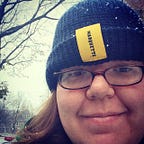Joe McAdams Explores Gender and Oppression in Tweets at Marquette
Elizabeth Gibes, librarian and director of the Digital Scholarship Lab, partnered with Dr. Theresa Tobin’s Spring 2017 Feminist Philosophy course in an effort to merge digital media with academic scholarship. This month, we would like to feature a project from the class by Joseph McAdams, titled “Gender and Oppression Online: A Discussion about Marquette’s Tweeting Habits.”
Joe decided to explore the ways in which gender, language, behavior, and social media intersect on Marquette’s campus, particularly via Twitter. To complete this project, he used several different kinds of digital media tools and created a project that demonstrates both the kind of analysis one can do with data found on the Internet and the versatility of open source tools in digital scholarship.
There’s a detailed explanation of his process on GitHub, but for the non-techies, here’s a quick summary of all the different pieces that Joe put together for his research. Using Twitter’s application programming interface (API), some Open Source Software libraries, and some pretty impressive coding skills, Joe created an application that can pull tweets from a specific geographical location (i.e., the Marquette campus) and analyze them according to various criteria. He used two libraries that could sort the data gleaned from the tweets: Compromise and Sentiment. Compromise parsed the tweets into “specific clauses, nouns, people, and topics” and “best-guess of inferred gender.” Sentiment rated the positive or negative tone of the tweet and its language.
With this information, Joe used Heroku to create a cloud-based application called femi-gnab-some that could perform the desired analysis and display it visually for users to explore.
Using his application, Joe broke down tweets by time of day and by gender. He explored the words used by male or female posters, their sentiment quotient (how positive or negative their tweets were), and more.
Even more interestingly, he analyzed the language a male poster used when talking about another male, or female poster when talking about another female, and studied the tone and behavior of one gender when communicating about or with the other.
As Joe said in his post, there are limitations. The possible analyses were restricted by the scope of the existing sources he used to create this tool. The libraries he employed to parse and score the tweets were only able to assign a gender to a Twitter user according to a pre-set assumption about “predictably ‘male’ or ‘female’ names,” which limited his final product to an analysis that fell along the traditional gender binary. “As such,” Joe wrote, “my analysis will exclude most social and contextual factors” because “I simply don’t have the expertise or resources to be able to analyze other complex topics like race, trans/intersex identities, class, or religious affiliations.”
What Joe has done with his collection of digital media tools and data is build the stepping stones for other projects that could potentially integrate some other types of identity factors and further explore the intersections between gender and language on social media platforms and beyond. As he said at the end of his post:
The final and perhaps most important takeaway from this project is understanding just how much control software engineers have in framing social interactions, and how big a problem the lack of diversity in this industry is.
Joe’s project illustrates what Digital Scholarship and the Digital Humanities can do together. He found a way to extract meaning from virtual data and created the tools to express it, allowing others to interpret the data. Projects like Joe’s may even inspire others to take his research question further or even to explore research questions of their own by engaging in the digital world.
For more projects like Joe’s, you can check out another project we featured from this course, Anna Miller’s podcast “Call Me Crazy.”
